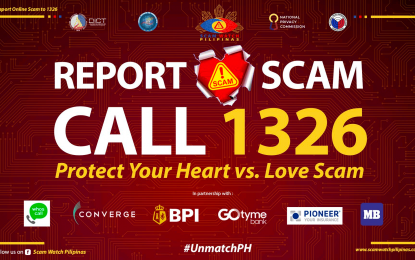
(Infographics courtesy of Scam Watch Pilipinas)
MANILA – The Cybercrime Investigation and Coordinating Center (CICC) and its private partners on Wednesday warned the public against the proliferation of “love scams” as Valentine’s Day draws near.
In a press conference in Taguig City, CICC executive director Undersecretary Alexander Ramos said love scams are cybercriminals that take advantage of the emotional vulnerability of their victims in several ways.
“Sa love scams, year in, year out, palaging may mga biktima diyan. At walang pinipili, bata at matanda (With love scams, year in, year out, they always have victims. And no one is safe, whether you’re young or old),” Ramos said.
Using the "sad boy, sad girl" ploy, scammers reach out to their victims— usually through social media or other messaging platforms— telling them a sad story, appealing to their pity, and eventually borrowing money.
“Wala rin pinag-iba yan, mayaman o matanda. Whether PHP1000 o PHP100,000, parehas silang biktima. Yun ang nakakasakit dun (There’s no difference, whether you’re rich or old. Whether they lose PHP1,000 or PHP100,000, they’re both victims. And that’s what’s painful),” he said.
The "seducers", meanwhile, are scammers that seduce their victims using attractive profile pictures, sharing and asking for private information, initiating sexual conversations, and eventually asking for nude photos to be used for blackmail.
“Karamihan ng mga biktima ay hindi lang babae, pati mga kapatid nating [LGBT] rin. Pero pati sila. Actually, maraming nagre-report coming from that sector (Most victims are not only women, but also from the LGBT. We’re actually receiving a lot of reports from that sector),” he said.
The "investors" or scammers that also use attractive profile pictures—usually foreigners—share ‘mega lifestyle’ photos, respond like robots in conversations, and entice their victims to invest in FOREX or crypto.
The "servicemen" are scammers who pose as middle-aged foreigners who work in the military and are assigned in Asia or the Middle East.
These scammers pretend to be looking for a life-long partner, target middle-aged women, and eventually ask for monetary assistance.
The "escorts" are scammers who use attractive profile pictures, engage in conversations of a sexual nature, send sexy or nude photos, and ask for money before a meet-up.
The "blackmailers" are scammers who make an effort to earn the trust of their victims, profess their love, and ask for sexy or nude photos to be used for blackmail.
The "slow burn" are scammers that play the long game through seemingly harmless conversations, share personal stories, express genuine interest, build trust, and refuse to meet with their target, until they can easily manipulate their victims and ask for money.
Lastly, the "predators" are mature men who target young women and will give their targets money, ask for discretion, and nude photos, and insist on meeting up with their victims.
“Makabagong Pilipino na ngayon, dapat alerto sa pag-iisip. Importante na pairalin natin ang utak kesa puso. Dahil ang mga nambibiktima, ginagamitan tayo ng utak din (It is the age of the modern Filipino, our minds must be alert. It is important to use our heads instead of our hearts because these scammers are smart),” he said.
During the briefing, ScamWatchPH founder Jocel De Guzman said the public could avoid falling victim to such scams by being skeptical of messages they receive out of the blue, being stingy with their money, ignoring, and reporting these messages, and other suspicious activities to the anti-scam hotline 1326.
On social media, he said the public can also verify the identity of potential scammers by checking if they have a verified status, asking for their full name and researching it on Google and other social media platforms, using reverse image search on their photos, ask for a phone number, request for a quick video call, and get as many information as possible such as their work, school, and other identifying information.
During the event, several private partners of the CICC and ScamWatchPH also took part in the information drive including Converge, BPI, Gogolook, and GoTyme. (PNA)
